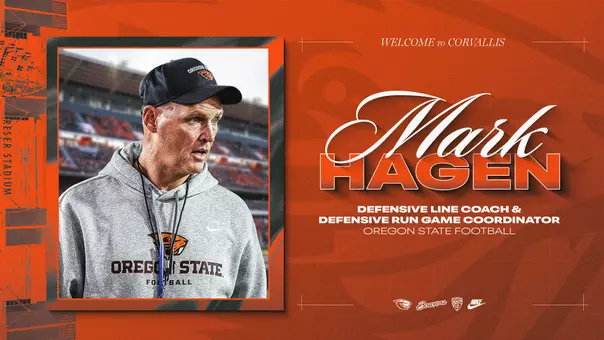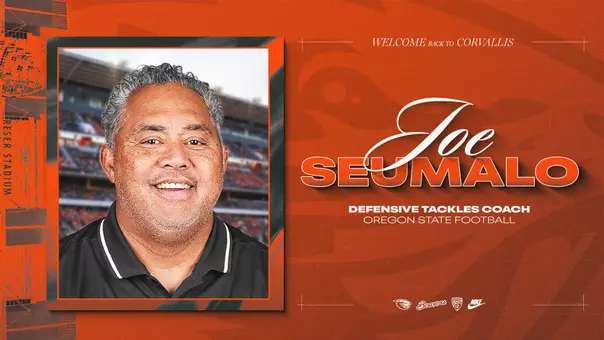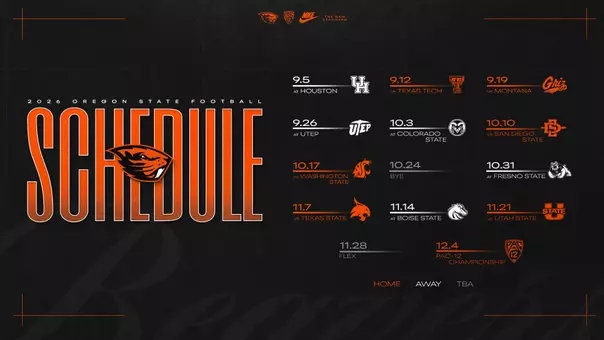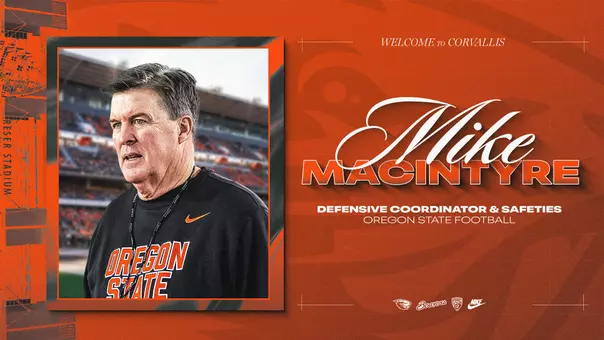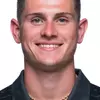Trent Bray Previews Saturday's Game Against Wake Forest
October 06, 2025 | Football
Oregon State football head coach Trent Bray met with the media Monday to preview the Beavers' matchup Saturday against Wake Forest.
Moderator:
Okay, coach, when you're ready, go ahead and we'll open up to questions.
Coach Trent Bray:
Yeah, just still looking ahead at Wake Forest. Talented team, quarterback's a super talented guy. They play well on both sides of the ball, play fast, physical. Going to be a challenge.
Reporter:
Coach, special teams, you made a change. What are your thoughts about going forward? How is that going to be handled?
Coach:
Yeah, Coach Akey is going to take it over. He'll be working with special teams and with some other help from assistant coaches, and all that. But, yeah, we've decided to handle it that way.
Reporter:
You brought up Wake Forest. Jake Dickert, former Cougar coach. He knows you guys, you know him. What's this matchup like for you guys?
Coach:
Yeah, I think his teams are well coached and they play physical, play hard, a lot like his Washington State teams. So, we expect them to come in here and play hard and be a challenge.
Reporter:
Halfway through the season, it's kind of a chance to reflect—one half to go. What can you do to get better? The other factor for me is that it's an independent season, no conference championship to play for, but big picture, Pac-12 2.0 is coming up and you want to be moving into getting back into conference play in style, winning games and being impressive because, hey, Boise State, San Diego State, they're catching some good teams. What are your thoughts about keeping everybody engaged and motivated for the big picture, which is, hey, Pac-12?
Coach:
I think finishing strong is the emphasis, finishing this season out strong and the way we want it to go. Momentum moving forward is a good thing, no question.
Reporter:
Scott Barnes issued a statement about the state of the program yesterday, and disappointment was the word used. What does that statement mean to you and does it practically change anything?
Coach:
Yeah, it is disappointing. We're 0-6. That's disappointing. That's not where we thought we'd be. What has to change is what we saw the last two weeks: we're in position to win games and we're not making the plays to win those games. Last week we had three opportunities at the end of the game to do it. We have to keep coaching these guys and put them in positions to be successful, and then we've got to make those plays when we have them.
Reporter:
Last week you said you believed Coach Christian could finish out the season and that you had confidence in him. What changed in the past seven days?
Coach:
It's been an evaluation of the whole year. I do believe in Coach Christian. He's a good coach, and he's proven that through a long career. The last two weeks we've had short weeks—playing on Friday, then the travel, so it wasn't the right time to do it then. Finally, a full week into a bye week, if we were going to do it, this would be the time. It just continued to be a problem, so we made that decision.
Reporter:
And you said Coach Akey would take it over. Is that Coach Daniel Akey or Robb?
Coach:
Robb Akey. Sorry, yep.
Reporter:
What's Daniel's function on the staff then?
Coach:
He's an analyst and helps with special teams.
Reporter:
Why was he retained if he's also a part of the special teams group?
Coach:
He wasn't the one making the decisions on what we were doing. He was kind of doing the busy work, making the drawings, and organizing things. He wasn't actually game planning for it.
Reporter:
People have been pretty upset about those three calls from the goal line—the direct snaps with Maalik motioning out. What's your defense of those play calls and what was the scheme analysis there?
Coach:
The defense of the play call is Maalik can't get under center. We can't run sneak with him. The defense of the play calling is we've got one yard to go, we've got more numbers than they do, we should be able to get one yard on that play. That is our best one-yard play. So you call your best one-yard play in those moments. You go back and watch the film, we've got more hats, we should win—and we didn't.
Reporter:
After the game you told The Oregonian you weren't able to move people with the line of scrimmage. You guys have played almost a dozen different offensive line combinations, all the same seven guys. When you have 21 on roster, what's led to exclusively playing those seven? Are those the only guys you trust in games, and why hasn't that changed?
Coach:
Those are the guys who can play winning football where we need to. The drop-off after them is significant, so playing more than those seven hasn't been an option.
Reporter:
In Scott's statement, he mentioned looking at specific things in the program that need to change, the two of you together. What are you looking at right now in terms of changing the program?
Coach:
In the immediate, it's the finishing of games and making sure, at the same time, who is doing these jobs and what are we asking them to do, and can they do it? If we're asking them to do something physical they can't do, we shouldn't do those things. If it's less, then it's got to be less. That's the immediate change that can happen that would change the last two weeks, which would change a lot about the season and where we're at.
Reporter:
Do you feel like the resources are in place for this program to build a long-term future out of this tough season? You've got recruiting, portal—do you have the resources? What do you say to people in the Oregon State community who are concerned?
Coach:
As far as recruiting, talking with all the commits, they've been good and solid with us; they decided to come here for reasons other than wins and losses. That hasn't hurt the guys we have. We've lost one because a Big Ten team came in. That's part of it; that happens. Interest hasn't waned because of the season. As far as resources, I feel good about where we're at. We want to grow in that area, no question, so we can do what we want from a personnel standpoint. I feel confident we'll get there.
Reporter:
How do you sell people to invest in the program and keep trying to build on that when things have gone the way they have, and there have been cultural shifts?
Coach:
It's simple. When things aren't going the way you want, you need more. That's when you need to pour into it. Backing away and removing yourself doesn't help. If we all want to get through this, we need to put more into it.
Reporter:
There's been reporting in recent weeks about issues on the recruiting trail—players who want to take visits elsewhere who may be committed to the program. Are you choosing to cut ties with those recruits?
Coach:
That was completely false. The one you're talking about—I can't go into directly—the reason we moved the other way was because of a decommitment, not because someone wanted to visit somewhere else. It was a decommit, so we brought in another position to fill that spot.
Reporter:
So the reporting around that is false?
Coach:
Yes, that's false.
Reporter:
Looking on the football side, a lot of success Saturday throwing to the middle of the field. Was that a scheme thing or chemistry between Maalik and the receivers?
Coach:
It always goes into who you're playing and what they do, and trying to attack that. So it lent itself to that in this game.
Reporter:
With NIL and the changing landscape, do you feel like you're getting the right return on your investment? If not, how do you get there?
Coach:
It's not a unique problem to Oregon State. It might be magnified because we're not at the $30 million level. Our return on investment this year has been much better than last year. Is it perfect? No. Is everyone contributing as hoped? No. We have to keep evaluating and keep them motivated—sometimes players lose motivation when things are handed to them. That's true across the country.
Reporter:
Defensively, against Houston you gave up an explosive play but didn't let it kill you. Against App State, the big plays turned into touchdowns. How do you limit explosive plays, especially in the secondary? And if you can't, how do you make sure it doesn't kill you on the scoreboard?
Coach:
Early in the game, we gave up two long balls but rebounded. In the second half, they got only 100 yards. We need to do a better job early—if we're playing press, we have to win at the line. If we miss, they get the advantage, and we need to get the guy on the ground. First drive, we did and held them to three. Second time, we didn't, and they got down to the four; scoring percentage there is in the 90s. That was more the issue than just the deep ball itself.
Reporter:
Have you made any other staff changes in terms of game day operation or play calling?
Coach:
No.
Reporter:
Coach Gundy said last week that Hankerson will be better if he doesn't carry 30 times a game. We saw what that looks like with Cornell against Houston. He got four carries this week. What goes into that and why isn't it occurring more?
Coach:
That's something I addressed with those guys after the game. We need to play Cornell more and take some off Anthony, especially since Anthony is beat up. He should have got more play.
Reporter:
What's Hank dealing with?
Coach:
Ankle.
Reporter:
In regards to Maalik's hand, you say he can't go under center, which is a big part of the offense. Why is he active if it's limiting?
Coach:
He can take it from gun, which is about 85-90% of our offense. When we want to do things under center like against Appalachian State, we put Gabarri in, and doing more with Gabarri is something we want anyway because he's talented.
Reporter:
You've made a large financial investment in Maalik. Have you considered a quarterback change?
Coach:
No, we haven't. We believe in Maalik. Last week there were some disappointing plays, but that's our job to keep getting him better. He obviously has talent—threw for a lot of yards and made plays. In crucial moments, we need him to make those plays.
Reporter:
Halfway through the season, we still haven't seen Exodus Ayers in a game. Do you anticipate having him play this year?
Coach:
I'm hoping, but not sure. That's out of my hands.
Reporter:
Can you go into any more detail?
Coach:
I can't, no.
Reporter:
You've seen a lot of good wide receivers. Trent Walker—his performance Saturday, his performance this season, seems to be a tough guy. He got hit hard a few times. His status? Thoughts on him as a performer?
Coach:
Trent's everything you want: leadership, work ethic, the way he plays. He's playing beat up, he's tough, competes, and shows up in big moments. He's the epitome of what we want.
Reporter:
With this kind of start, is the chemistry in the locker room still strong after a loss like Saturday? Have you noticed any change in mindset?
Coach:
I won't lie, the game hurt us. You could see that because it was one we expected to win and didn't. But the way they bounced back yesterday—resilient all year long. I look to see that the rest of the season. We have guys who want to compete, and that's the great thing about college athletics—every week is a great opportunity. Team goals and individual goals, you compete for both.
Moderator:
Thanks for your time, coach.
Coach:
All right, thank you.
Moderator:
Okay, coach, when you're ready, go ahead and we'll open up to questions.
Coach Trent Bray:
Yeah, just still looking ahead at Wake Forest. Talented team, quarterback's a super talented guy. They play well on both sides of the ball, play fast, physical. Going to be a challenge.
Reporter:
Coach, special teams, you made a change. What are your thoughts about going forward? How is that going to be handled?
Coach:
Yeah, Coach Akey is going to take it over. He'll be working with special teams and with some other help from assistant coaches, and all that. But, yeah, we've decided to handle it that way.
Reporter:
You brought up Wake Forest. Jake Dickert, former Cougar coach. He knows you guys, you know him. What's this matchup like for you guys?
Coach:
Yeah, I think his teams are well coached and they play physical, play hard, a lot like his Washington State teams. So, we expect them to come in here and play hard and be a challenge.
Reporter:
Halfway through the season, it's kind of a chance to reflect—one half to go. What can you do to get better? The other factor for me is that it's an independent season, no conference championship to play for, but big picture, Pac-12 2.0 is coming up and you want to be moving into getting back into conference play in style, winning games and being impressive because, hey, Boise State, San Diego State, they're catching some good teams. What are your thoughts about keeping everybody engaged and motivated for the big picture, which is, hey, Pac-12?
Coach:
I think finishing strong is the emphasis, finishing this season out strong and the way we want it to go. Momentum moving forward is a good thing, no question.
Reporter:
Scott Barnes issued a statement about the state of the program yesterday, and disappointment was the word used. What does that statement mean to you and does it practically change anything?
Coach:
Yeah, it is disappointing. We're 0-6. That's disappointing. That's not where we thought we'd be. What has to change is what we saw the last two weeks: we're in position to win games and we're not making the plays to win those games. Last week we had three opportunities at the end of the game to do it. We have to keep coaching these guys and put them in positions to be successful, and then we've got to make those plays when we have them.
Reporter:
Last week you said you believed Coach Christian could finish out the season and that you had confidence in him. What changed in the past seven days?
Coach:
It's been an evaluation of the whole year. I do believe in Coach Christian. He's a good coach, and he's proven that through a long career. The last two weeks we've had short weeks—playing on Friday, then the travel, so it wasn't the right time to do it then. Finally, a full week into a bye week, if we were going to do it, this would be the time. It just continued to be a problem, so we made that decision.
Reporter:
And you said Coach Akey would take it over. Is that Coach Daniel Akey or Robb?
Coach:
Robb Akey. Sorry, yep.
Reporter:
What's Daniel's function on the staff then?
Coach:
He's an analyst and helps with special teams.
Reporter:
Why was he retained if he's also a part of the special teams group?
Coach:
He wasn't the one making the decisions on what we were doing. He was kind of doing the busy work, making the drawings, and organizing things. He wasn't actually game planning for it.
Reporter:
People have been pretty upset about those three calls from the goal line—the direct snaps with Maalik motioning out. What's your defense of those play calls and what was the scheme analysis there?
Coach:
The defense of the play call is Maalik can't get under center. We can't run sneak with him. The defense of the play calling is we've got one yard to go, we've got more numbers than they do, we should be able to get one yard on that play. That is our best one-yard play. So you call your best one-yard play in those moments. You go back and watch the film, we've got more hats, we should win—and we didn't.
Reporter:
After the game you told The Oregonian you weren't able to move people with the line of scrimmage. You guys have played almost a dozen different offensive line combinations, all the same seven guys. When you have 21 on roster, what's led to exclusively playing those seven? Are those the only guys you trust in games, and why hasn't that changed?
Coach:
Those are the guys who can play winning football where we need to. The drop-off after them is significant, so playing more than those seven hasn't been an option.
Reporter:
In Scott's statement, he mentioned looking at specific things in the program that need to change, the two of you together. What are you looking at right now in terms of changing the program?
Coach:
In the immediate, it's the finishing of games and making sure, at the same time, who is doing these jobs and what are we asking them to do, and can they do it? If we're asking them to do something physical they can't do, we shouldn't do those things. If it's less, then it's got to be less. That's the immediate change that can happen that would change the last two weeks, which would change a lot about the season and where we're at.
Reporter:
Do you feel like the resources are in place for this program to build a long-term future out of this tough season? You've got recruiting, portal—do you have the resources? What do you say to people in the Oregon State community who are concerned?
Coach:
As far as recruiting, talking with all the commits, they've been good and solid with us; they decided to come here for reasons other than wins and losses. That hasn't hurt the guys we have. We've lost one because a Big Ten team came in. That's part of it; that happens. Interest hasn't waned because of the season. As far as resources, I feel good about where we're at. We want to grow in that area, no question, so we can do what we want from a personnel standpoint. I feel confident we'll get there.
Reporter:
How do you sell people to invest in the program and keep trying to build on that when things have gone the way they have, and there have been cultural shifts?
Coach:
It's simple. When things aren't going the way you want, you need more. That's when you need to pour into it. Backing away and removing yourself doesn't help. If we all want to get through this, we need to put more into it.
Reporter:
There's been reporting in recent weeks about issues on the recruiting trail—players who want to take visits elsewhere who may be committed to the program. Are you choosing to cut ties with those recruits?
Coach:
That was completely false. The one you're talking about—I can't go into directly—the reason we moved the other way was because of a decommitment, not because someone wanted to visit somewhere else. It was a decommit, so we brought in another position to fill that spot.
Reporter:
So the reporting around that is false?
Coach:
Yes, that's false.
Reporter:
Looking on the football side, a lot of success Saturday throwing to the middle of the field. Was that a scheme thing or chemistry between Maalik and the receivers?
Coach:
It always goes into who you're playing and what they do, and trying to attack that. So it lent itself to that in this game.
Reporter:
With NIL and the changing landscape, do you feel like you're getting the right return on your investment? If not, how do you get there?
Coach:
It's not a unique problem to Oregon State. It might be magnified because we're not at the $30 million level. Our return on investment this year has been much better than last year. Is it perfect? No. Is everyone contributing as hoped? No. We have to keep evaluating and keep them motivated—sometimes players lose motivation when things are handed to them. That's true across the country.
Reporter:
Defensively, against Houston you gave up an explosive play but didn't let it kill you. Against App State, the big plays turned into touchdowns. How do you limit explosive plays, especially in the secondary? And if you can't, how do you make sure it doesn't kill you on the scoreboard?
Coach:
Early in the game, we gave up two long balls but rebounded. In the second half, they got only 100 yards. We need to do a better job early—if we're playing press, we have to win at the line. If we miss, they get the advantage, and we need to get the guy on the ground. First drive, we did and held them to three. Second time, we didn't, and they got down to the four; scoring percentage there is in the 90s. That was more the issue than just the deep ball itself.
Reporter:
Have you made any other staff changes in terms of game day operation or play calling?
Coach:
No.
Reporter:
Coach Gundy said last week that Hankerson will be better if he doesn't carry 30 times a game. We saw what that looks like with Cornell against Houston. He got four carries this week. What goes into that and why isn't it occurring more?
Coach:
That's something I addressed with those guys after the game. We need to play Cornell more and take some off Anthony, especially since Anthony is beat up. He should have got more play.
Reporter:
What's Hank dealing with?
Coach:
Ankle.
Reporter:
In regards to Maalik's hand, you say he can't go under center, which is a big part of the offense. Why is he active if it's limiting?
Coach:
He can take it from gun, which is about 85-90% of our offense. When we want to do things under center like against Appalachian State, we put Gabarri in, and doing more with Gabarri is something we want anyway because he's talented.
Reporter:
You've made a large financial investment in Maalik. Have you considered a quarterback change?
Coach:
No, we haven't. We believe in Maalik. Last week there were some disappointing plays, but that's our job to keep getting him better. He obviously has talent—threw for a lot of yards and made plays. In crucial moments, we need him to make those plays.
Reporter:
Halfway through the season, we still haven't seen Exodus Ayers in a game. Do you anticipate having him play this year?
Coach:
I'm hoping, but not sure. That's out of my hands.
Reporter:
Can you go into any more detail?
Coach:
I can't, no.
Reporter:
You've seen a lot of good wide receivers. Trent Walker—his performance Saturday, his performance this season, seems to be a tough guy. He got hit hard a few times. His status? Thoughts on him as a performer?
Coach:
Trent's everything you want: leadership, work ethic, the way he plays. He's playing beat up, he's tough, competes, and shows up in big moments. He's the epitome of what we want.
Reporter:
With this kind of start, is the chemistry in the locker room still strong after a loss like Saturday? Have you noticed any change in mindset?
Coach:
I won't lie, the game hurt us. You could see that because it was one we expected to win and didn't. But the way they bounced back yesterday—resilient all year long. I look to see that the rest of the season. We have guys who want to compete, and that's the great thing about college athletics—every week is a great opportunity. Team goals and individual goals, you compete for both.
Moderator:
Thanks for your time, coach.
Coach:
All right, thank you.
Players Mentioned
Introducing Oregon State Head Coach JaMarcus Shephard
Monday, December 01
Oregon State Football Interviews: November 25, 2025
Tuesday, November 25
Oregon State Football Press Conference: Interim Head Coach Robb Akey (Nov. 24, 2025)
Monday, November 24
Oregon State Football Interviews: November 12, 2025
Wednesday, November 12



